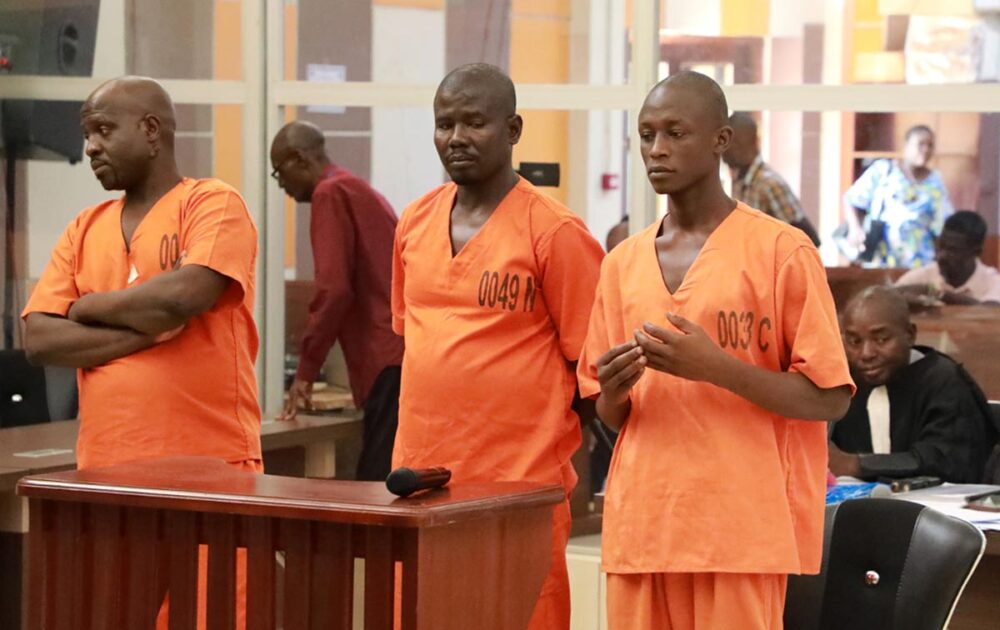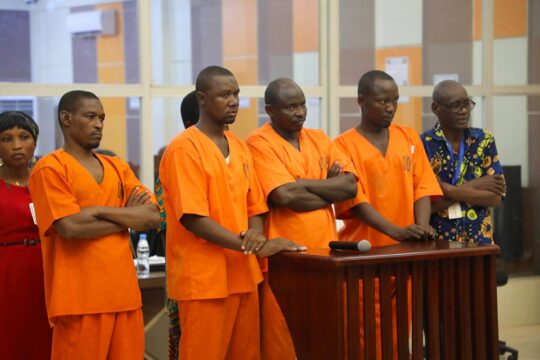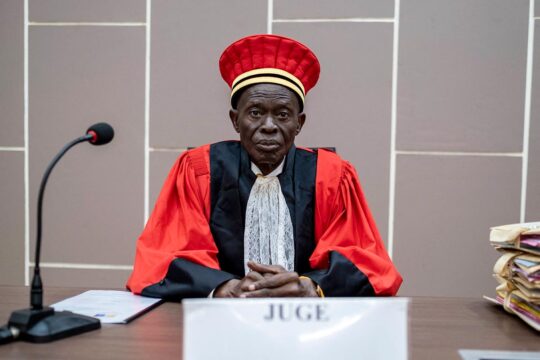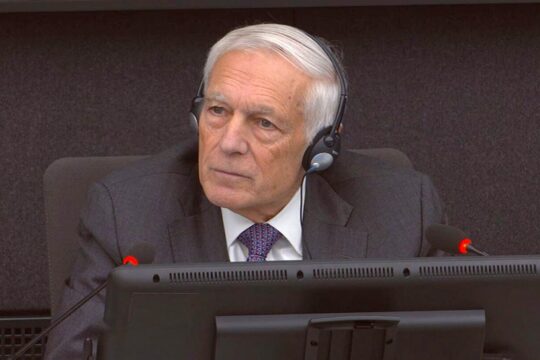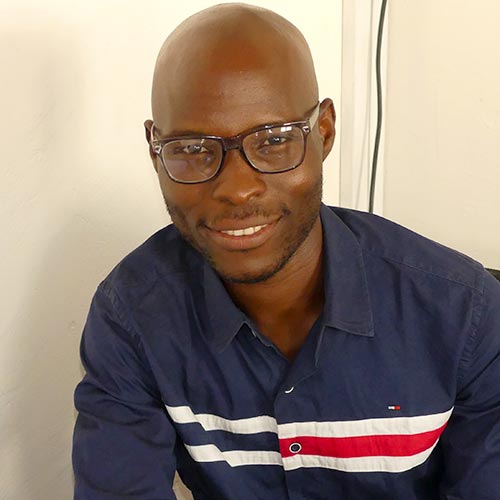While the proceedings have brought fragments of truth to light, doubts, contradictions and procedural flaws leave the verdict hanging in the balance in this third trial to be completed before the Special Criminal Court (CPS), a UN-sponsored tribunal based in Bangui, the capital city of the Central African Republic (CAR).
Seven defendants are involved for alleged war crimes and crimes against humanity committed during community violence in March and April 2020 in Ndélé and its surroundings, in the north of CAR. However, since the beginning of the trial, only three defendants have appeared in court: Ousmane Serge Abdoulaye Hassane, Adramane Seleman alias “Ada”, and Ahmat Younouss alias “Encadreur”, all from the Rounga ethnic group, which was opposed to the Goula ethnic group during the conflict.
A chain of violence in a tense city
The events date back to 6 March 2020. On that day, an attack broke out in Ndélé, the epicentre of ethnic tensions between the Roungas and the Goulas. Several days of fighting left dozens dead, hundreds displaced and revived memories of past violence [read our article on the Ndélé 1 trial].
“This trial is one of the many faces of the inter-ethnic conflict that is tearing our country apart. In Ndélé, the Roungas were the self-proclaimed lords. They controlled security, customs checkpoints and public order. This power was backed by weapons, not by law,” says Albert Panda, lawyer for the civil party.
According to the prosecution, the attacks were carried out by members of the Popular Front for the Rebirth of the Central African Republic (Front populaire pour la renaissance de la Centrafrique - FPRC), mainly from the Rounga community, in the context of a struggle for territorial and political control of the region. According to the special prosecutor’s office, the defendants participated in the attacks of 6, 25, 26 and 27 March 2020 in Ndélé and its surroundings, notably in Gozbeïda and Alihou. These attacks initially resulted in deaths, before provoking deadly reprisals by the Goulas. The seven men, four of whom were absent from the courtroom, are accused of persecution, murder, attempted murder, attacks against the population and destruction of property.
The courage and trauma of the witnesses
From 14 February to 20 March 2025, the CPS heard testimonies from victims and community leaders, as well as statements from the three defendants present in court. During the trial, the prosecution called 28 witnesses to the stand. While some testimonies were poignant, others were less convincing.
Ibrahim Senoussi, the sultan-mayor of Ndélé, who testified at the opening of the trial, claimed to recognise two of the three accused: “Ada” and “Encadreur”. Senoussi specified that “Encadreur” was not present during the first two attacks, but was present during the third. As for “Ada”, he was present in Ndélé, but did not participate in the clashes. He confirmed that the conflict broke out on 6 March 2020, when the Roungas attacked the Goulas. He also stated that the FPRC headquarters was led by Assan Adam, who according to the sultan is now deceased, and that Youssouf Moustapha, alias Badjadje (prosecuted in Ndélé 1 and tried in absentia) and Abakar Balamane (prosecuted in Ndélé 2 but absent from the trial) were the main leaders of the Rounga attacks.
When questioned by deputy prosecutor Alexandre Tindano about “Encadreur”’s involvement, he replied that he had not seen him fighting, but confirmed his presence on 29 March. As for “Ada”, although he was present, his direct involvement remains uncertain.
Firmin Gremende, mayor of Mgbolopata on the outskirts of Ndélé, did not recognise any of the defendants. However, he reported hearing heavy gunfire on 6 March 2020. He recalled that between 9 a.m. and 10 a.m. that day, more than 70 people, mainly Christians, had taken refuge in his home, telling him that the Roungas had attacked the Goulas.
A climate of terror
Other witnesses described a climate of terror created by armed groups close to the FPRC, which they claimed were led by some of the accused. Chantal Adjou, the mother of one of the victims, accused “Ada” of having arrested and killed her son. “He [her son] had refused to let my daughter marry him. Since then, “Ada” hated us. My son was tortured to death on his orders. His body was thrown behind the gendarmerie,” she said, staring the accused straight in the eye.
Ismaël Chahalna Ibrahim, representative of the Chadian embassy in Ndélé, also described a climate of fear: “The Galandja neighbourhood was emptied, houses were burnt down, and twelve members of my community were killed.” However, the witness does not know whether the defendants were directly involved in the fighting. He nevertheless confirmed that Abdramane Seleman alias “Ada” was chief of staff before the event and that he led the mixed brigade, a local self-defence group.
“Vague and subjective” testimony
The defence lawyers denounced the testimony as “vague, subjective, emotional or politically motivated”. Some witnesses called by the defence were not heard due to a lack of interpreters or logistical resources. One by one, each defendant present at the trial denied direct involvement.
Oumar Serge Abdoulaye Assan, a young frail-looking Rounga, presented himself as a victim of war, enlisted at the age of 15. “I was born in Damara, I am 22 years old. I was arrested near Abdoulaye Hissen’s vehicle, which was transporting FACA [Central African Armed Forces] soldiers. I was with the driver of the vehicle, four other people fled. I never carried a weapon or wore the military uniform. I was a cook for the FPRC, I rarely went out and I know nothing about the attacks. During the fighting, I was at the FPRC base in Ndélé. I don’t know the other defendants, except by name. Abdoulaye Hissen was my boss, but I knew nothing about how the FPRC operated. I was forced to be there,” he said in the dock.
His defence produced a document indicating that he was born on 15 June 2004, which would make him a minor at the time of the events. “A child soldier is legally a victim, not a criminal,” argued Simplice Edgar Ngama, who concluded: “The benefit of the doubt goes to the accused.” The prosecution was sceptical: “We have found inconsistencies in the documents. He was fully responsible at the time of the events,” insisted prosecutor Alain Tolmo.
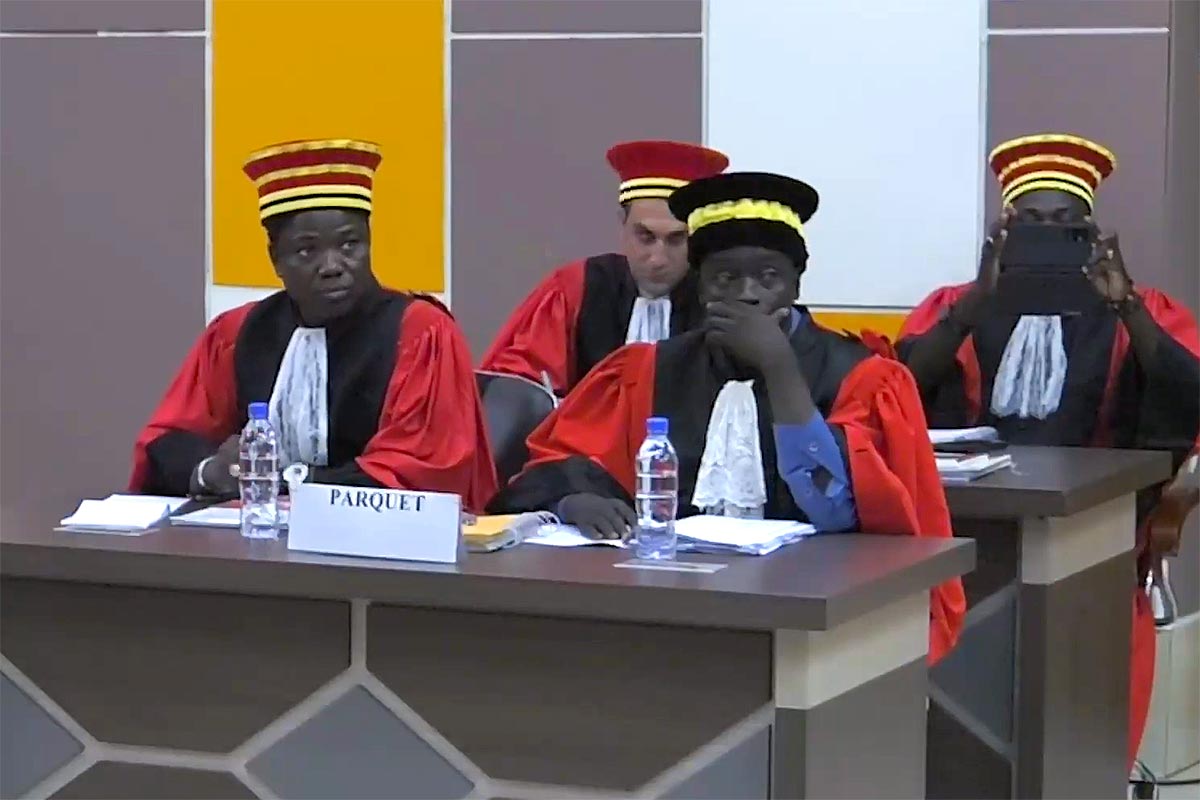
“I have never handled a weapon”
Abdramane Seleman, alias “Ada”, presented himself as a former mechanic who became a “Comixte”, meaning a local security officer within the FPRC. He claimed to have been forcibly enlisted in 2008. “I was on my way to Garba to buy fish when I was forcibly enlisted in the Convention of Patriots for Justice and Peace (Convention des patriotes pour la justice et la paix - CPJP) led by Nourredine Adam and Abdoulaye Hissen. I have never handled a weapon,” he said, denying having any kind of military authority. “From 11 to 15 March 2020, I was at Abdoulaye Hissen’s house and I did not go out. I was appointed to supervise the disarmament process. I never ordered an attack,” he explained. Faced with testimony accusing him of threats, torture and murder, he was astonished: “I don’t understand why I’m here. All of this has been fabricated against me.” “The CPS should look for the real culprits,” he added.
“The minutes testify to your involvement,” said deputy prosecutor Tindano. For Panda too, the accused had indeed fought, and he added that a military leader does not need to be on the ground to be held responsible. Ada’s defence, led by Benoît Sarrassengue, insisted on procedural flaws and the violation of the principle of presumption of innocence. “I was detained and tortured by my captors before being handed over to the judicial authorities. I was forced to sign documents without understanding their content before being transferred to Bangui under [UN] escort,” Ada explained in court.
“I was in Sudan for medical treatment”
Ahmat Younouss, alias “Encadreur”, went further and even denied being the man prosecuted by the public prosecutor’s office. “I am Amat Abakar Issen,” he says, rejecting the identity, the first and last names Ahmat Younouss, given by the accusation. “The prosecutor’s office is confusing me with someone else. I was not in Ndélé during the events. I was in Sudan for medical treatment,” he declared in court. His lawyer, Joachim Pessinam, submitted his passport, birth certificate and other identity documents in support of this argument. He pleaded a miscarriage of justice: “The court cannot convict a man on hearsay and an identification that is contested by all available civil documents.”
“Encadreur” disputes his identity, but he does not dispute his date of birth. Married to two women and father of nine children, he was born in 1986 in Ndélé. A second-class soldier, he joined the army in 2021. He also acknowledged having been wounded by gunfire on the road from Bria to Ndélé at the time of the events, but while he was on his way to Ndah [located 300km northeast of Ndélé] for medical treatment. He denied having taken part in the fighting and claimed he was unaware of the accusations against “his men”. He denied having held the position of deputy chief of staff but admitted to being a member of the FPRC and a former member of the CPJP, under the command of Nourredine Adam and Abdoulaye Hissen since 2009.
“This trial is not perfect, none of them are”
But the defendants’ defence did not break the will of the prosecution.
Deputy prosecutor Tindano accused the three men of being “active links in a criminal network”. In addition to the firearms seized at their homes, the prosecution relied on reports drawn up by UNPOL, the United Nations special judicial police unit, and by the investigating magistrate’s office.
In its closing arguments on 5 May 2025, the prosecution concluded that the seven defendants were responsible as co-perpetrators of the attacks on 6, 25, 26 and 27 March 2020. In its view, they acted in concert as part of a plan to weaken or eliminate the Goula faction in a context of inter-ethnic conflict.
"The evidence establishes a structured and coordinated plan by the military leaders of the FPRC. The essential contribution of each of the defendants, and the direct link between the attacks and the deaths of civilians by gunshot or by fire, are beyond doubt,” said deputy prosecutor Tindano. He identified two types of responsibility: direct responsibility for ordering the crimes, and command responsibility for failing to prevent or punish them. In his view, the FPRC leaders exercised effective control over their troops and took no measures to prevent or punish these crimes.
The prosecution is therefore seeking a 10 years’ imprisonment for Oumar Serge Abdoulaye, 20 years for Abdramane Seleman alias “Ada” and Ahmat Younouss alias “Encadreur”, and life imprisonment for the absent defendants.
And they concluded: “This trial is not perfect. None of them are. But it has shed light on mechanisms of terror that cannot go unpunished. The people are waiting for a strong signal.”
“A strong signal to other perpetrators”
Panda, in a relentless charge, declared: "These men were the leaders of armed groups. This trial is not an accident, it is the direct consequence of impunity. Mr President, you have a historic responsibility to take strong action. That of declaring these men guilty. It would send a strong signal to other perpetrators. The Roungas were the lords of Ndélé, controlling both security and customs checkpoints.” Panda explained that it was the desire to prevent the Goulas from controlling the checkpoints that triggered this deadly conflict. “It is common knowledge that most of the defendants are FPRC officials, which makes them fully responsible as members of the chain of command. The law requires you to assess their guilt beyond reasonable doubt, Mr President. You will treat this case with all due attention, out of respect for the victims.”
Ngama, Abdoulaye Assan’s lawyer, replied back: “We are not asking for clemency. We are demanding justice. The CPS must not convict a child by misinterpreting the law.” In his view, the Court does not have jurisdiction to try his client. “A child associated with armed forces or armed groups is considered first and foremost a victim and cannot be prosecuted on this basis alone.” In the proceedings, Assan has three dates of birth. “This confusion constitutes a fundamental procedural flaw,” concluded Ngama, who is seeking acquittal.
Sarrassengue, Abdramane Seleman’s defence lawyer, pointed to the flawed structure of the case: “No material evidence. No photos. No written orders. This trial is based on impressions, not facts.” The lawyer contested the legal charges brought, considering that the facts do not constitute war crimes or crimes against humanity. He recalled his client’s participation in the disarmament process and maintains that the latter never killed anyone in the course of his duties with the FRPC. He requested the acquittal of Abdramane Seleman alias “Ada”, or failing that, his release on the basis of reasonable doubt.
Regarding Ahmat Younouss alias “Encadreur”, Pessinam argued: “My client is illiterate. He does not know how to read or write. He cannot be accused of having a structured plan to kill. This trial must shed light on the matter, not sacrifice innocent people to set an example.” The lawyer cast doubt on the prosecution’s evidence, which he considered vague, contradictory or unreliable; he pointed out that out of 28 witnesses, 22 do not recognise his client. In his view, only three pieces of prosecution evidence are admissible, two of which do not directly relate to the events. Pessinam concluded by requesting the acquittal of his client on the grounds of an obvious error of identity and lack of evidence of guilt.
Guy Antoine Dangavo, defence counsel for the absent defendants, reviewed the charges against them, emphasising the lack of concrete evidence against them. He criticised the lack of information on the identity, role and functions of each defendant within the FPRC and the prosecution’s inability to establish the defendants’ active participation.
He reiterated that the burden of proof lies with the prosecution. He questioned the relevance and reliability of the evidence in the case file, warning against life sentences based on evidence deemed insufficient. In conclusion, he requested the acquittal of the defendants.
NDÉLÉ 1: 15 TO 20 YEARS’ IMPRISONMENT
On Friday 13 December 2024 in Bangui, the Special Criminal Court handed down its verdict in the Ndélé 1 case. Azor Kalite, Charfadine Moussa, Antar Hamat and Wodjonodroba Oumar Oscar were all found guilty of crimes against humanity. As a result, Kalite was sentenced to 20 years in prison, while the other three were sentenced to 15 years in prison.
The judges largely followed the special prosecutor’s office. They believe that Kalite and his accomplices are responsible beyond reasonable doubt for the crimes committed in Ndélé on 29 April 2020. Kalite received the heaviest sentence. According to the judges, “as chief of staff of the FPRC, he exercised effective control over the armed elements who came with him from Bria and Ndiffa as reinforcements and who participated in the crimes committed in Ndélé. At no time did the accused Kalite intervene to prevent or punish the crimes committed by his subordinates, despite his knowledge of them.” The defence has appealed this decision.
A dozen Goulas defendants were prosecuted in this case. While four were brought to trial, tried and convicted, the others are being tried in absentia in another trial. The proceedings were concluded on 15 May 2025 and the verdict for those absent is due to be handed down on 24 July 2025, again for war crimes and crimes against humanity committed between March and April 2020 in Ndélé.


